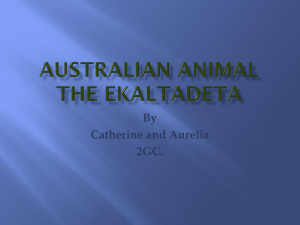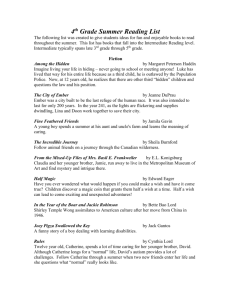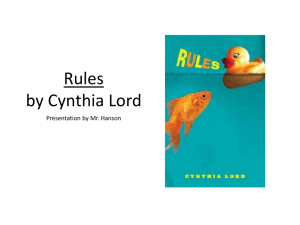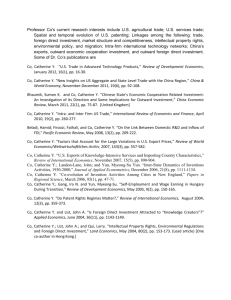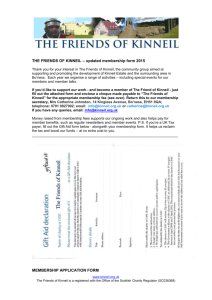The Exploration of Human Experience in Jane Austen's Northanger
advertisement
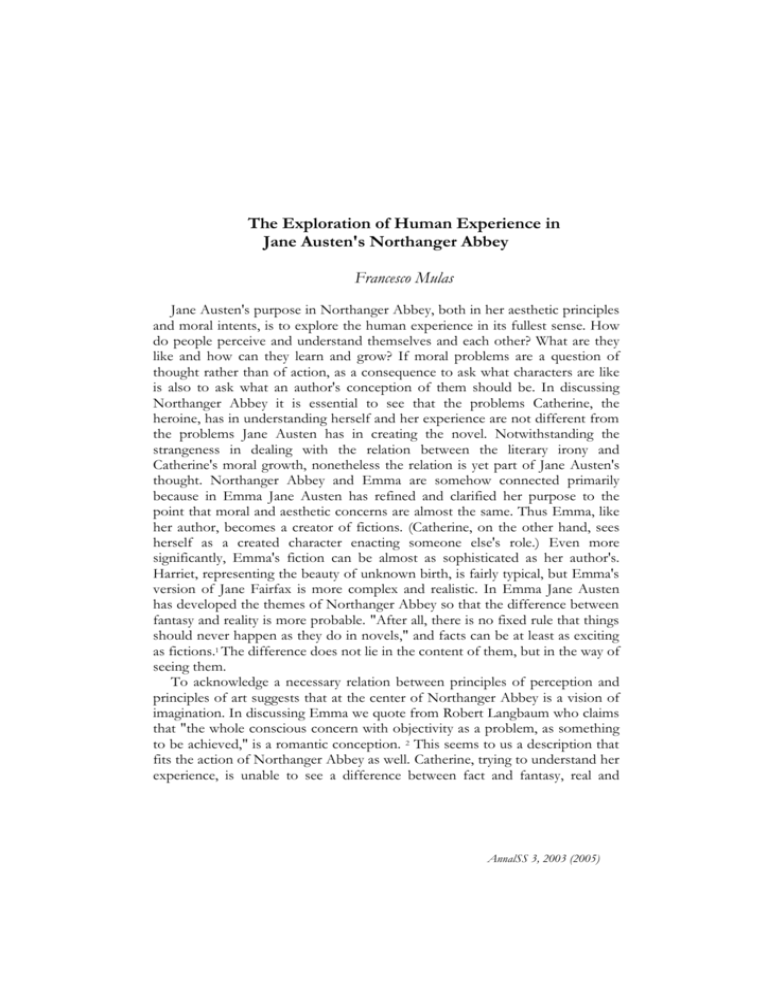
The Exploration of Human Experience in Jane Austen's Northanger Abbey Francesco Mulas Jane Austen's purpose in Northanger Abbey, both in her aesthetic principles and moral intents, is to explore the human experience in its fullest sense. How do people perceive and understand themselves and each other? What are they like and how can they learn and grow? If moral problems are a question of thought rather than of action, as a consequence to ask what characters are like is also to ask what an author's conception of them should be. In discussing Northanger Abbey it is essential to see that the problems Catherine, the heroine, has in understanding herself and her experience are not different from the problems Jane Austen has in creating the novel. Notwithstanding the strangeness in dealing with the relation between the literary irony and Catherine's moral growth, nonetheless the relation is yet part of Jane Austen's thought. Northanger Abbey and Emma are somehow connected primarily because in Emma Jane Austen has refined and clarified her purpose to the point that moral and aesthetic concerns are almost the same. Thus Emma, like her author, becomes a creator of fictions. (Catherine, on the other hand, sees herself as a created character enacting someone else's role.) Even more significantly, Emma's fiction can be almost as sophisticated as her author's. Harriet, representing the beauty of unknown birth, is fairly typical, but Emma's version of Jane Fairfax is more complex and realistic. In Emma Jane Austen has developed the themes of Northanger Abbey so that the difference between fantasy and reality is more probable. "After all, there is no fixed rule that things should never happen as they do in novels," and facts can be at least as exciting as fictions.1 The difference does not lie in the content of them, but in the way of seeing them. To acknowledge a necessary relation between principles of perception and principles of art suggests that at the center of Northanger Abbey is a vision of imagination. In discussing Emma we quote from Robert Langbaum who claims that "the whole conscious concern with objectivity as a problem, as something to be achieved," is a romantic conception. 2 This seems to us a description that fits the action of Northanger Abbey as well. Catherine, trying to understand her experience, is unable to see a difference between fact and fantasy, real and AnnalSS 3, 2003 (2005) 114 Francesco Mulas unreal. Part of her immaturity derives precisely from the fact that she is not conscious of objectivity, for her perception is a passive acceptance of some truths, rather than something to be obtained through time and experience. For example, one can assume that girls who become engaged do so for certain reasons and will act in certain ways. The meaning of an engagement is an established truth. But Catherine learns that truth is not a definite thing, and that there is a relation between creativity and perception, between what she imagines and what she sees. Imagination in her opinion seems to be the power which provides access to reality. One of the reasons why Catherine has natural vitality is because she thinks that the relation of a person to the external world must be an active one. Northanger Abbey is not a lesson in rejecting the false world of the imagination for the true world of clear vision. It is a lesson in the imaginative quality of vision. The sense in which a clear perception of objective reality can be considered as creative lies in the contents of perception, the particular nature of the truths Catherine learns as the story develops. When her story begins, Catherine is a girl without experience. Yet she always has something which can fulfil the lack of experience, she has imagination. And one way of describing her growing up is that imagination comes to mean something other than what she has always thought. She, however, has two major failures of judgment, first in believing that Isabella is good and second in thinking that General Tilney is evil. Yet both are the result of one basic consideration: that she accepts easy answers, and also that she comes to conclusions. And to come to conclusions is to stop imagining. It does not take any imaginative power for Catherine to assume that others act from the same motives she would, nor merely to apply literary conventions to real situations. Fact is not an imitation of fiction. Catherine's affirmation of sentimental conventions is a denial of her own imagination. She accepts a pre-established vision of the world rather than exercising her own. Catherine's role is a passive one and she allows herself to become part of other people's fictions. This passivity does have a comic significance, in that her uncritical reflecting of other people’s visions functions to show how absurd they are. Thus Catherine responds so openly and fully to Henry's teaching on the picturesque that "she voluntarily rejected the whole city of Bath as unworthy to make part of a landscape" (: 94). More seriously, Catherine accepts Isabella's presentation of herself as a sentimental heroine. It is amazing that Catherine continues to accept Isabella's AnnalSS 3, 2003 (2005) The Exploration of Human Experience 115 version when she violates it in every scene. Expressing the desire to run away from the obsessive staring of two young men, she goes after them, while saying that one was really quite handsome. After insisting that no one on earth could make her leave her seat, Isabella dances all evening with Captain Tilney. These examples are endless. Yet Catherine remains credulous, even when she observes the inconsistencies. She accepts the world as Isabella tells it to her, not just because she is inexperienced, but because she thinks perception is a matter of straightforward description. People are what they say and say what they mean. And since people tell the truth, one should not have difficulties in believing and understanding them. Catherine has yet to realize that truth is particular and multiple and incomplete, and that judgment is an active process of exploration and understanding. Like Isabella, Catherine sees others in terms of herself. Henry, laughing at her explanation that Captain Tilney wished to dance with Isabella out of good nature, tells her: How very little trouble it can give you to understand the motive of other people's actions...With you it is not, How is such a one likely to be influenced, What is the inducement most likely to act upon such a person's feelings, age, situation, and probable habits of life considered--but, How should I influenced, What would be my inducement in acting so and so? (: 109-110). Neither direct knowledge of one's own motives, nor the acceptance of external accounts can replace for the moral activity of perception. Looking at this from another's point of view as a definition of the imaginative transcendence of one's own point of view does not have nearly the significance in Northanger Abbey that it has in Emma. The theme is there, and Jane Austen has yet to develop it into an idea of narrative technique. Catherine's failure to create her own understanding is surely why, when she cannot explain General Tilney in terms of her own character and experience, she jumps to such an extreme and unfounded account as that he has murdered his wife. This is the mechanical process of applying a convention to a real situation. That this is actually a failure of imagination is shown by the fact that Catherine's fancies do not actually come to life for her. When she excitedly sets off to investigate Mrs. Tilney's room, she hopes to find proof of the poor victim's suffering, "in the shape of some fragmented journal, continued to the last gasp" (: 161). This deep hope is not a grotesque and unforgivable proof of AnnalSS 3, 2003 (2005) Francesco Mulas 116 coldness of heart precisely because Catherine is not really imagining Mrs. Tilney's pain. We laugh and forgive her, because not even she can take her imagination too seriously. And even in the moments of her deepest suspicions, she is always polite to the general. Jane Austen's purpose is to rescue imagination and emotion from a misuse which takes life away from them and destroys their value. Catherine, in spite of her inexperience, is not in danger from Isabella's constant externations of her eternal friendship or even from her own negative imaginations regarding General Tilney. Not truly believing in either, she is more offended than hurt by Isabella's false affirmations, and more ashamed than relieved by the general's innocence. The serious danger is that she, by accepting external fictions, will not actively use her own powers of mind and heart to understand herself and others. Her judgments may be mistaken, they may be incomplete. But they will have the soundness of emerging from her own sense of her character and experience. They will be her own, rather than imposed from outside. This is one reason why Henry must speak indirectly. Good judgment is not a set of rules. It is a relation between an individual and the world outside. Catherine's understanding can only grow from her own perceptions. When distracted from the responsibility of selfknowledge, she is left unaware of her feelings and in danger of acting opposite to them. Henry points this out after leading her to realize that she is not totally heartbroken over Isabella: “You feel, as you always do, what is most to the credit of human nature. Such feelings ought to be investigated, that they may know themselves.” (: 173) This plain statement is an ethical and an aesthetic must for Jane Austen. An ignorance of real feelings is made an explicit motif in the story through the attack on gothic and sentimental literature. Such works violate human limitations, within which personal responsibility and freedom and love are possible. By not recognizing the internal limitations of nature, and consequently its capacities, they avoid the standards of judgment and value. As Catherine grows she comes to have some thoughts not appropriate to a heroine: Charming as were Mrs. Radcliffe's works,...it was not in them perhaps that human nature, at least in the Midland counties of England, was to be looked for... Among the Alps and Pyrenees, perhaps, there were no mixed characters. There, such as were not spotless as an angel might have the dispositions of a fiend. But in England it was not so; among the English, she believed, in their AnnalSS 3, 2003 (2005) The Exploration of Human Experience 117 hearts and habits, there was a general though unequal mixture of good and bad. Upon this conviction, she would not be surprised if even in Henry and Eleanor Tilney, some slight imperfection might hereafter appear...(: 166-67) The idea that people are likely to make mistakes, meaning that they are neither angels nor devils but somewhere in between, is the central theory of Northanger Abbey. It is Catherine's major lesson, and the assumption on which human relations must be based and from which Jane Austen builds her theories about imagination and fiction. Catherine's awareness that characters are mixed means that there are no specific conventions which she can apply to her experience in order to understand it. She must, instead, create her own beliefs from what she gains of that experience. Catherine's attempt to understand will itself be limited. She too will be wrong, will make mistakes. Her judgment can be fallible as well. But Jane Austen is not interested in teaching her characters how to be right. Instead, she likes to insist that they recognize and value the possibility of being wrong. The problem with heroines, however, is that they are not wrong. They may be victims and be deceived by the villains, but they never do or feel anything for which they can be blamed. Heroines do not have mixed characters, and since they are, by definition, good, they are also predictable. And once characters are defined perfect it means for Jane Austen that they are unreal for only characters who are imperfect can grow. Heroines, therefore, are limited, in the sense that being already perfect they have no possibilities for psychological development. In Jane Austen's presentation of Catherine she has deliberately connected moral imperfection with openness. The action of the story depends on the fact that she needs to learn and grow. That is why limits are also capacities and limitations are the condition for self-definition. It is because Catherine is ordinary that she can be special, in the sense of being a particular person rather than a type. For Catherine, as for Emma, not everything can be known both because she cannot actually see from another person's view and because her own view, being based on immediate experience, is limited. Imagination goes beyond those limits, extending positive judgment outside the self. This idea of vision is more effectively presented in Emma, who has more natural capabilities than Catherine. Still, after the humiliating revelation of how foolish she had been, she becomes more aware about herself and the world she lives in. She has not acquired any more intelligence or intuition, nor has she learned to do without AnnalSS 3, 2003 (2005) 118 Francesco Mulas her dreams, believing however in the correct judgments of those who are wiser than she is. In fact, although she has no more qualities than she ever had before, her role in the novel becomes more active after that moment of shame and disappointment. She does not do very much, but she does accept the independence and responsibility of forming her own judgments. It is quite on her own that she concludes from Isabella's letter that she is a superficial, spoiled young lady. Far from being a conclusion, to see and judge correctly are things to be constantly achieved. The proper use of imagination is as a continuous activity, a creative process of perception and judgment. It goes on as long as a person can see and think and feel, because truth in Northanger Abbey is never final. There is always more to learn, and imagination becomes the awareness of one's own limits. It also leads to the realization that there is something about other people which is finally, extremely private, thus inaccessible. General Tilney, as the murderous tyrant, is entirely defined. But as the man whom Catherine "did believe, upon serious consideration, to be not perfectly amiable" (: 167), has possibilities for development. And Catherine's growth can perhaps be measured by the change in her method of judging him. Her opinion is a final judgment, highly inappropriate to her own experience and her observations . It is an imaginative guess, but one not based on her knowledge or her feelings and not obtained by any positive process of judgment. It is a guess without strength or meaning, because it is borrowed from others; not derived or originated from her own imaginative life. Henry's lecture is directed at bringing Catherine back to the frankness of the familiar world, the life she knows, because her education must come from experience: “Remember that we are English, that we are Christians. Consult your own understanding, your own sense of the probable, your own observation of what is passing around you.” (: 165) Catherine does learn to know herself and her situation. When she is about to leave Northanger Abbey, deeply insulted and humiliated by such a departure, Catherine forgets her own pride and promises to write to Eleanor that she is safely home. At such a time to sympathize with what Eleanor must be feeling shows that Catherine can guess Eleanor's feelings and responds appropriately because she believes in Eleanor's goodness of heart. Catherine learns that to judge openly is an ethical necessity as an attempt at understanding which involves both information and guess. If all were as it AnnalSS 3, 2003 (2005) The Exploration of Human Experience 119 seems there would be no difficulties in judgment and no need for imagination. But because many people cannot be completely known and because understanding includes so much more than personal experience, Catherine must be given a power to see beyond herself. Imagination is the power of seeing which allows her to judge without the advantage of direct knowledge. In Northanger Abbey imagination is specifically that awareness and affirmation of limits through which Catherine sees that there is something about other people which is inaccessible to us. To know that there is more to be known about others than what she finds out of them is itself an essential kind of information. It means that she cannot give final conclusions, that judgment is never complete. When General Tilney so rudely forces her to leave Catherine searches for a reason and realizes that she cannot think of any appropriate or probable explanation. So she leaves the question open, accepting that when she is without direct knowledge other people may have motives which are momentarily unknown. As Catherine's parents conclude, "it was a strange business, and ... he must be a very strange man." (: 196) Catherine's education cannot then be considered as a lesson in good sense. Certainly, that is not what Henry teaches her. The part of the story which tells of Catherine's life at home after her visit shows that if someone at all speaks good sense it is Mrs. Morland, and she does it in a very convincing way, as well. Near the end of the novel she sums up the value of Catherine's journey home: It is always good for young people to be put upon exerting themselves; and you know, my dear Catherine, you always were a sad little scatterbrained creature; but now you must have been forced to have your wits about you, with so much changing of chaises and so forth; and I hope it will appear that you have not left anything behind you in any of the pockets. (: 196-197) But Catherine, though remembering her packages, has left her heart behind. And being a more self-reliant person than before going to Bath, she has said nothing of this to her mother. Henry Tilney has taught Catherine to trust in her own observations and sense of the probable, and to investigate her feelings. But that is not all. He has also taught her the pleasure in learning to see the difference and complexity of experience. Catherine had perceived her world according to simple conventions, described it in simple language. But Henry helps her to free her points of view from all kinds of preconceptions. As the real representative of AnnalSS 3, 2003 (2005) Francesco Mulas 120 reason, Henry appears to have unusual methods and Catherine at the beginning finds him very strange. His conversation had "fluency and spirit--and there was an archness and pleasantry in his manner which interested her, though it was hardly understood by her"(: 19). Eleanor too remarks to Catherine that Henry has strange ways. He pleases Mrs. Allen by knowing the bargain price of a true Indian muslin. He shocks Catherine by the comparison of a dance to a marriage, and surprises her when he says he enjoys reading gothic novels. And he initiates Catherine into the pleasures of not saying what one means. Henry's delight in words and appreciation of both their precise use and their misuse is the most important way he communicates his sense of the difference and distinction of the familiar world. Henry attracts Catherine not because he is a teacher of good sense but because he is a very interesting person. Henry has an active imagination, not bounded by social conventions and free to perceive and judge the rich material of his experience. He has learned how to use the powers of his mind and heart, and Catherine is understandably impressed by all this. Thus when she leaves her fancies for a clear vision of the world around her she discovers that it is an exciting place. The real feelings she has for her new friends have a depth and interest which her exciting and pleasant dreams could never approach. That, of course, is what Henry has known and offered all throughout the story. And appropriately, it is Henry who has the courage to disobey his father for the sake of true love, in the best spirit of romance. Andrew Wright has remarked that in Northanger Abbey, "Good sense, ironically, is limited too." 3 However, this should not be taken as a reaction of Catherine against Henry's point of view. Good sense, for Jane Austen, is always limited, because she would insist on the value and the right facts have in dominating fiction. Good sense without imagination cannot lead to deep moral judgment because it cannot include the limits and the possibilities of experience. Good sense, in other words, cannot account for the unknown. Lionel Trilling, in a brief reference to Northanger Abbey, has offered a fine comment: We are quick, too quick, to understand that Northanger Abbey invites us into a snug conspiracy to disabuse the little heroine of the errors of her corrupted fancy--Catherine Morland, having become addicted to novels of terror, has accepted their inadmissible premise, she believes that life is violent and AnnalSS 3, 2003 (2005) The Exploration of Human Experience 121 unpredictable. And that is exactly what life is shown to be by the events of the story: it is we who must be disabused of our belief that life is sane and orderly. 4 It is because life can be "violent and unpredictable," and because it, therefore, cannot be understood and lived according to a set of conventions or even according to the good sense of Mrs. Morland, that Catherine needs her imagination. Life is not well arranged, as one may think, it is strange and it must be worked out. And Henry, with his wit, elegance, nonsense, sympathy, and passion, is the most strange of all. It is through Henry's many different qualities rather than through his father's rudeness that Jane Austen explains both to Catherine and us readers that the real value is in life not in fiction. At this point Henry reveals himself to be more than a guide or a reward. He is the proof that real people are more interesting than books, and that people, when they are in books, must carry at least part of the qualities they have in real life, in order to gain some credibility. AnnalSS 3, 2003 (2005) Francesco Mulas 122 Notes 1 McKillop, Alan D., 1958, “Critical Realism in Northanger Abbey”, in From Jane Austen to Joseph Conrad, ed. Robert C. Rathburn and Martin Steinmann, Minneapolis: 44. 2 Langbaum R., 1963, The Poetry of Experience, New York,: 29. 3 Wright, A., 1954, Jane Austen's Novels: A Study in Structure, London: 96. 4 Trilling, L., 1955, The Opposing Self, New York: 207. AnnalSS 3, 2003 (2005)
